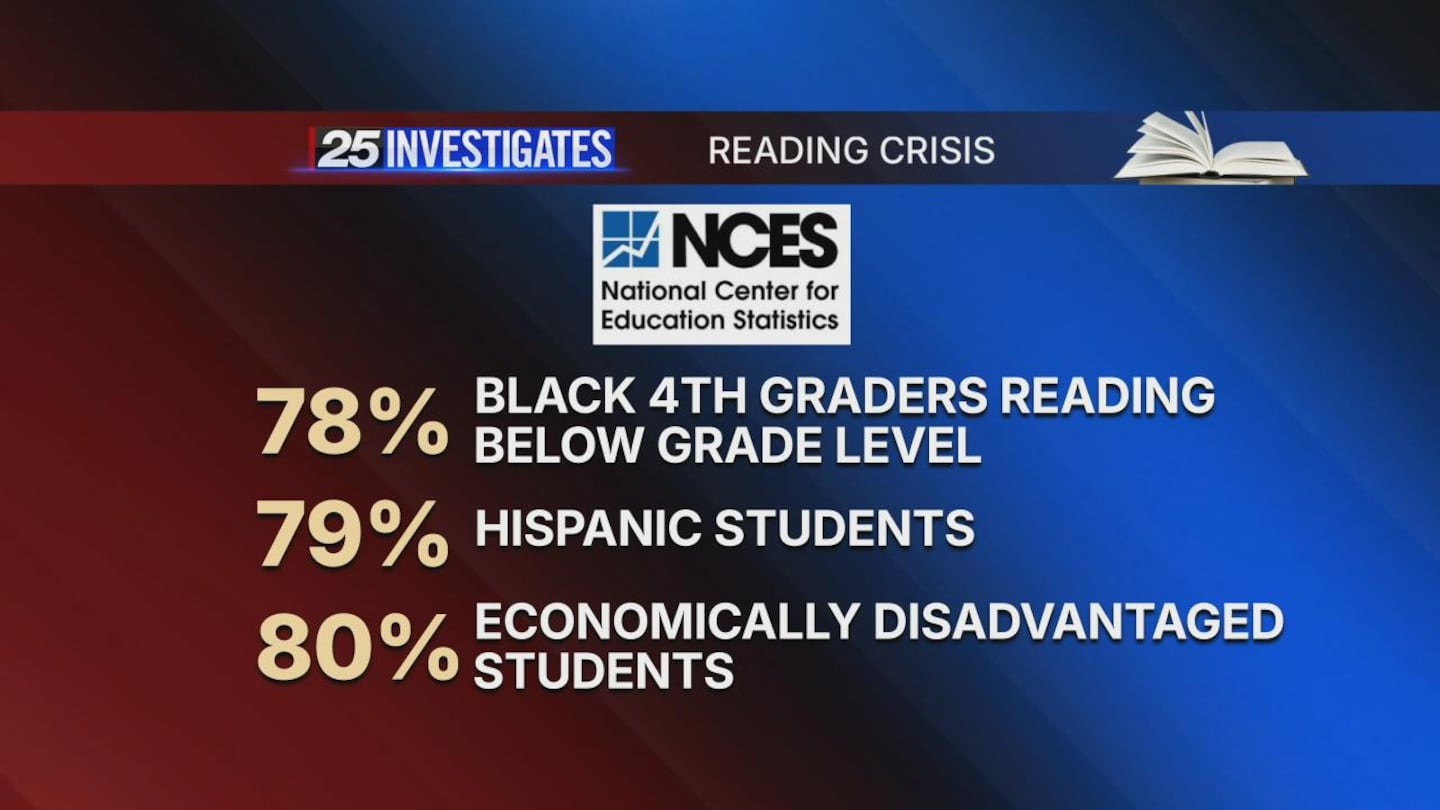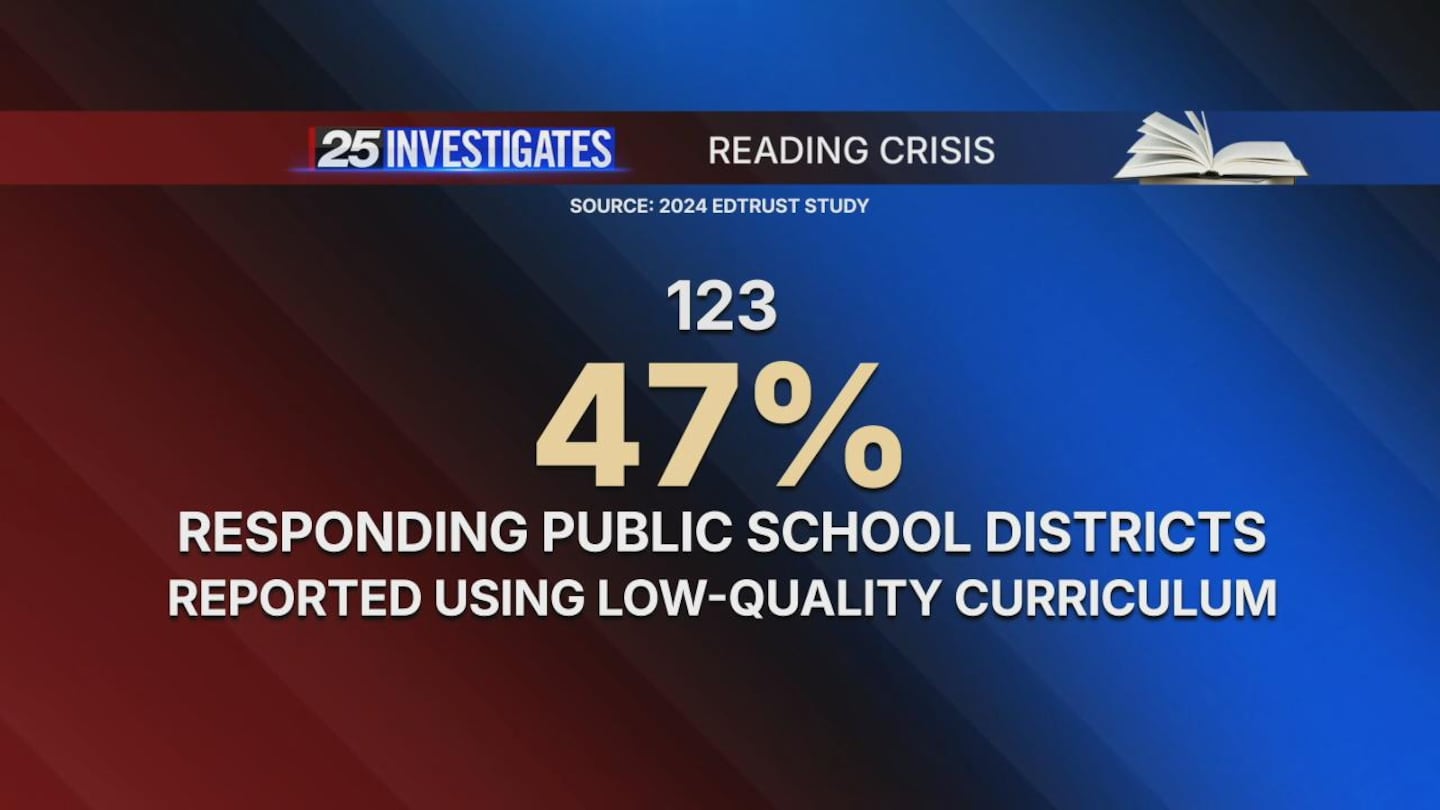In 2024, 40% of Massachusetts 4th graders were reading at or above grade level, according to The Nation’s Report Card.
Think about that.
That means, based on assessments, more than half of 4th graders in the Commonwealth, 60% are not.
25 Investigates spoke one-on-one with the Massachusetts Secretary of Education about a new state initiative to tackle this reading crisis.
But some advocates say the state’s plan is coming up short.
INTERVENTIONS ARE CRITICAL
Five years after COVID-19 lockdowns, Massachusetts students are still wrestling with reading. Test scores are not improving. Some show even further decline. Experts and advocates alike say there was a burgeoning literacy crisis years before the pandemic. But as with so many issues, the pandemic shined a big bright light on it.
“When I got help, it made things easier. But like on my own, it was really hard,” said 12-year-old Laila Buissereth of Hyde Park.
For the 6th grade Boston Public Schools student, reading is a joy. But not long ago, it was a dread.
“She didn’t have the fluency of reading. It will take her some time to, you know, read the words,” said her mother, Jenny Marcelin.
Marcelin says it was a second-grade teacher who first detected Laila’s reading struggles. It was during COVID lockdowns, Marcelin saw them firsthand. Compounding it all, Laila suffers from a migraine disorder and epilepsy.
“Parents, we think just because we see the kids sitting and reading the book, we think they’re fine. They can read. But there’s a difference between being able to read and read to comprehend,” Marcelin told Boston 25′s Kerry Kavanaugh.
Marcelin says tapped into resources for parents and students through BPS and Laila received in-school tutoring. She calls the interventions critical.
“It was very important. It was a life-changing moment for us,” Marcelin said.
DIGGING INTO THE DATA ON LITERACY
Data shows thousands of Massachusetts kids are struggling with reading.
According to the National Center for Education Statistics, which authors The Nation’s Report Card, 60% of Massachusetts 4th graders were reading below grade level.
The numbers are even more stark for certain student groups. 78% of black 4th grade students and 79% of Hispanic students are reading below grade level. And so are 80% of students considered economically disadvantaged in the Commonwealth.
“It’s a crisis,” says Genesis Carela, a senior policy analyst for EdTrust, a national nonprofit working to improve equity in education.
“Literacy is liberation. It’s empowerment. Without literacy, as an adult, you’ll have trouble applying to jobs and filling out a job resume or reading labels on medication. It has real-world implications,” Carela said.
“We want to get this right,” said Massachusetts Secretary of Education Patrick Tutwiler. “We believe deeply that reading is the most critical and fundamental skill, not just for education, but really as we think about an individual’s life.”
25 Investigates was at South Memorial Elementary School in Peabody in January as Tutwiler and other state officials announced funding for a new 5-year initiative known as ‘Literacy Launch.’ Peabody among 15 districts getting the first round of grant money through the initiative to improve literacy instruction targeting kids aged 3 through grade 3.
“We need to intervene during that period of time because after it, it is much harder to get them on track,” Tutwiler told Kavanaugh in a one-on-one interview after the event. “We are deeply concerned, and this is a scenario, unfortunately, that has persisted for a number of years. If you look at last year’s increased data for grade three, only 42% were meeting or exceeding expectations on the ELA portion of the MCAS.”
Tutwiler says the state is leaning into the literacy crisis with both strategy and funding.
“We proposed another 25 million in the current budget filing for FY26. And then we’re thinking about also addressing the needs of first graders through high dosage tutoring. That’s another $25 million,” Tutwiler told Kavanaugh.
Literacy Launch, Tutwiler says, will ensure the select districts are using high-quality reading curriculum and have the right amount of people in place to teach it.
According to a 2024 EdTrust study, 123 or 47% of Massachusetts public school districts that reported their literacy curriculum to the state, reported using low-quality curriculum. Districts are not required to report the curriculum they are using. Certain reading curricula are no longer considered strong enough to help students achieve literacy goals as they are not classified as ‘evidence-based.’
EdTrust is supporting legislation requiring all Massachusetts school districts to use high-quality, evidence-based curricula. The non-profit says several states have already moved to do this.
Carela says the state’s Literacy Launch initiative is a good start but has shortcomings.
“The funding is not nearly enough to reach all of the students that are meant to be targeted by the initiative,” Carela said. “There’s thousands of 4th through 12th graders who are struggling to read. Students who are sending voice notes instead of text messages because they’re struggling with literacy.”
“Why not a more comprehensive approach that is focusing on all ages,” Kavanaugh asked Tutwiler.
“While we are prioritizing our youngest learners, does also include professional development and supports for school districts to address the needs of older students. We are by no means discounting their needs,” Tutwiler said.
FILLING IN THE GAPS
“I get calls and emails from parents saying my child is struggling, his or her confidence is just going down the tubes,” said business owner and educator Lisa Phillips.
Phillips started a private tutoring service, Study Buddies working with families to fill in the gaps.
“And they say, you know, we just we read with our child at home, and we want to help them. But we feel like we don’t have all the tools.” Phillips said.
Phillips says her business is growing to meet the demand now employing more than 40 teachers offering services to more than 160 families a week in one-on-one sessions. Phillips says the need for literacy help is booming.
“I think that there’s so much more that educators want to be able to offer. And unfortunately, it comes down to funding. It comes down to staff. And so, the resources just aren’t there,” Phillips said.
Private services do come at a cost. A Study Buddies private one-hour session is $90, according to the website. There are group rates as well.
“We’re hugely supported by our public school system, but they just need more than that. And we’re lucky that we can do it,” said Medfield Mom, Kate Wood whose kids utilize Phillips’ service.
Wood says both her children struggled with reading and those struggles were exacerbated during the pandemic. Wood says the private tutoring helped her kids’ confidence soar.
“Having a great teacher who can identify that, and as long as the family’s open to it, then you can help your kid as soon as possible,” Wood said.
But as such services are not available to everyone, Carela says parents and caregivers need to be aware of what they can tap into in their child’s schools.
“And it’s also about a really strong family-school connection and family engagement, so that during those sort of out-of-school times, parents are equipped with the resources, the information and the tools that they need to support student learning,” Carela said.
Resources that helped get young Laila Buissereth back on track and wanting to read again.
“How are you feeling now when you’re called upon and you have to read aloud,” Kavanaugh asked her.
“Like more calm and confident,” Laila said. “I think it’s really important because some kids like want to learn how to read, but they can’t do it on their own.”
Download the FREE Boston 25 News app for breaking news alerts.
Follow Boston 25 News on Facebook and Twitter. | Watch Boston 25 News NOW
©2025 Cox Media Group











